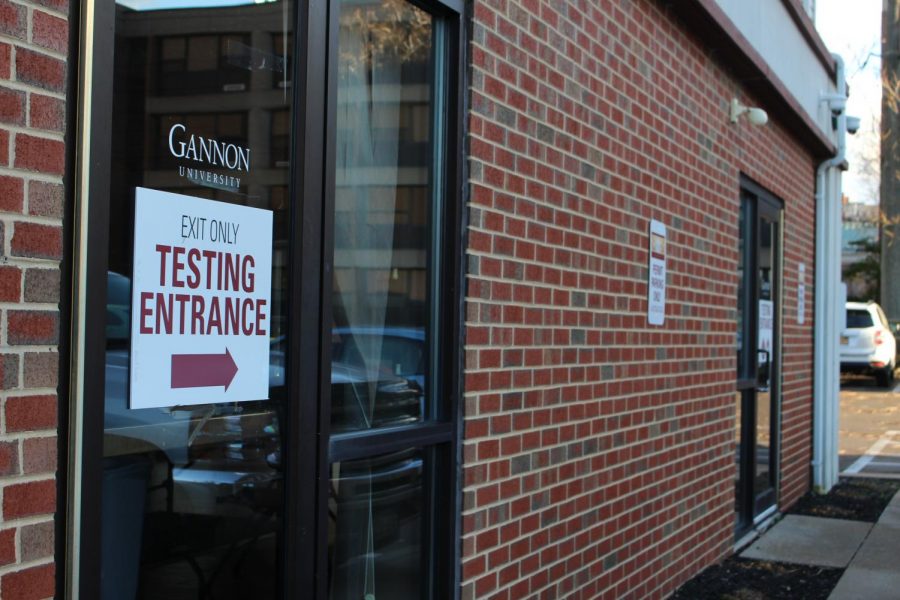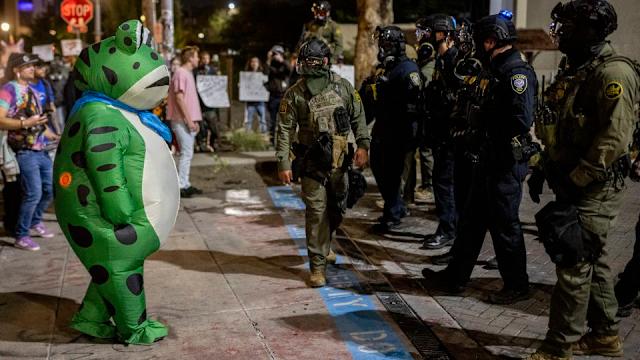Vaccination aids in return to normal
Continued precaution is important in maintaining normalcy
November 16, 2021
Since the spring of 2020, COVID-19 has ravaged the globe, shutting down schools, businesses, institutions and the social structure that was based upon them. Now, about a year and a half past the beginning stages of the pandemic, things have changed.
It seems that the world is beginning to go back to normal. And a huge part of this is the masses of people who have chosen to get vaccinated.
Mary Iwanenko, Ph.D., director of the Health Center at Gannon University, said that not only does vaccination help keep individuals safe from COVID-19, but it helps reconnect families and friends.
“Once you’ve received an entire series of a vaccine and waited the recommended time for your body to build immunity (14 days following your single-dose series or the second dose of a two-dose series), you can visit in-person with other people who have been vaccinated, without wearing a mask (unless the specific location you’re visiting requires masking),” Iwanenko said.
Ariel Farren, a senior psychology major, said that at Gannon and in the communities she inhabits, she has seen positive effects of the COVID-19 vaccine.
“There are less outbreaks and people being put into quarantines,” Farren said. “Getting vaccinated not only protects you from different strains of the virus, but also from easily passing it on to others — including those with weakened immune systems.”
Iwanenko also said that exposure to COVID-19 is less of a concern and hassle if an individual has been fully vaccinated — a fully vaccinated individual does not need to quarantine if they are deemed a close-contact or have been exposed to the virus.
“You do not need to quarantine if you are fully vaccinated and not experiencing symptoms, creating less disruption to everyday life,” Iwanenko said.
However, unvaccinated individuals are required to quarantine if determined to be a close contact to an individual who has tested positive for COVID-19.
Unvaccinated students who do not follow testing surveillance protocol will be reported to Student Accountability. Those who remain noncompliant after that will be disenrolled from the university.
Choosing to be vaccinated allows for more convenience in everyday life, and more peace of mind.
“After a year of uncertainty, the vaccine has finally arrived with the numbers of vaccinated individuals on the rise, and clear benefits to strongly considering becoming vaccinated,” Iwanenko said. “By choosing to be vaccinated, you can protect not only yourself and your family, but your community as well, and experience less disruption and inconvenience to everyday life.”
Doug Oathout, chief of staff and director of Marketing and Communications at Gannon, said that while COVID-19 is still a concern, the pandemic as a whole is less debilitating to individuals and social structures than it was in the beginning.
“We continue to wrestle with COVID on a near-daily basis, but unlike a year ago, the pandemic is not defining our everyday experience on campus,” Oathout said. “We have not faced widespread disruptions, and I believe this is a result of everyone taking seriously our collective mitigation efforts as well as our individual health.”
While things seem to be improving, Iwanenko said it is too early to tell how this will impact the Gannon community in the future.
“It is still too soon to determine how the COVID pandemic will settle into endemicity on the Gannon campuses,” Iwanenko said.
“Much of this will be determined by how the surrounding communities in Erie and Ruskin recover, and things may look different at each location. The endemic phase of COVID-19 will determine what our new ‘normal’ will look like, with the likelihood that COVID-19 will very much be a part of it in some way, shape or form.”
Farren said that life before the COVID-19 pandemic seems far from reach.
“So much has happened since COVID began — powerful movements have begun and mental and physical health have worsened,” Farren said. “What life used to be like doesn’t even seem normal anymore, as this is what we have been living through for almost two years now.”
However, Farren also said that the fall 2021 semester is the first semester since the start of the pandemic that things on campus are leaning more toward normalcy and less toward chaos.
“This semester, COVID is still prevalent but seems less of a worry,” Farren said. “With over 70% of the Gannon population being vaccinated, I feel as we are closer to the days where we will no longer need to worry about grabbing a mask before we leave our dorms or being nervous when someone in your class coughs.”
Farren said that more in-person events are taking place, and less meetings are being held on Zoom.
“Attendance of these events aren’t what they used to be, but for students who experienced college prior to the pandemic, it feels slightly like the college experience we once had.”
Even despite the upcoming winter months, Iwanenko said that Gannon is well-prepared to combat the spread of COVID-19.
“I believe that the COVID-19 mitigation strategies we have adopted at Gannon are among the best in the country and that we are equipped to manage whatever comes our way,” Iwanenko said. “Even with the rising number of COVID-19 cases in the surrounding Erie community, our Gannon-Erie campus has been able to keep our positivity rate at a much lower percentage than the country at large, and our Ruskin campus has not had one positive case on campus since mid-October.”
However, it is uncertain whether or not COVID-19 numbers will actually rise over the winter. Whether COVID-19 numbers will rise or not, sicknesses of all kinds will most likely increase over the winter, as they do most years.
“What I know for certain is that we continue to see a rise in illness and a need for health services,” Iwanenko said.
The implementation of COVID-19 precautions, such as wearing masks or social distancing, has normalized taking safety measures when it comes to other illnesses as well, Farren said.
“People seem to be more wary of sicknesses and symptoms,” Farren said. “Working remotely seems to be normal and telehealth services are likely to stay around as well.”
It is still important to take precautions, especially with the holiday season approaching, Oathout said.
“For now and through the holidays, we owe it to each other and ourselves to wear our masks indoors and avoid large gatherings,” Iwanenko said. “And if you haven’t been vaccinated, please consider getting vaccinated.”






